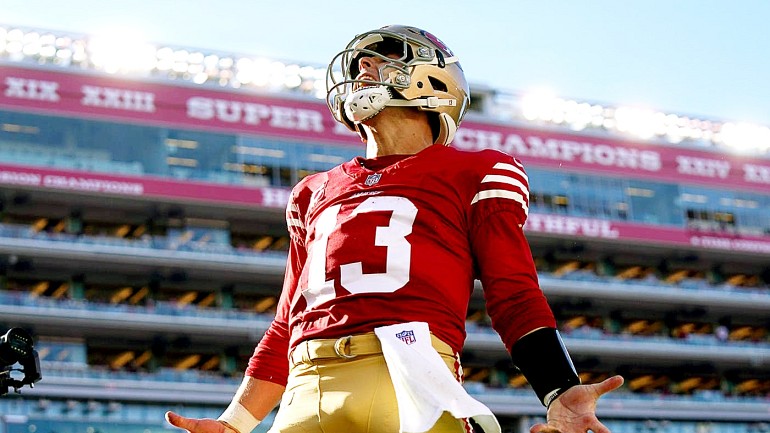Sooner or later, those heartbreaking losses catch up to you, right? That's the concern as the San Francisco 49ers head into free agency and look to retool the roster of the NFC Champions. Can the gut-wrenching pain of two Super Bowl losses and two NFC Championship Game losses in five years start to take its toll on the players? Deep postseason runs, season after season, can have physical impacts. And deep postseason losses, year after year, can have emotional impacts.
When you look at teams like the '70s Pittsburgh Steelers, '80s 49ers, '90s Dallas Cowboys, the most recent dynasty of the New England Patriots, and even the recent success of the Kansas City Chiefs, they were all able to forge ahead even after making deep postseason runs year after year. The difference? Those teams won those big games. They weren't losing them.
From 1969-1976, the Minnesota Vikings played in four Super Bowls and lost them all. But that was a span of eight seasons. The greater heartbreak for the players, coaches, and fans in Minnesota was no doubt felt during the 1973-1978 seasons when they lost three Super Bowls, one NFC Championship, and two Divisional Playoff Games. That's a lot of heartbreak in six years.
Over the next eight seasons, the Vikings made the postseason only twice. But that was a different time. During most of those deep postseason runs, the NFL only played 14 games in a regular season. Today, the NFL season is 17 games long. And those extra games, along with deep postseason runs, can take its toll.
The Denver Broncos lost three Super Bowls in four years. Even though they had one of the greatest quarterbacks of all time in John Elway, they were blown out in all three losses. They faced two legendary teams, the 1986 New York Giants and the 1989 49ers. The 55-10 loss to the 49ers in Super Bowl XXIV, is still the biggest blowout in Super Bowl history.
But one of those Super Bowls, against Doug WIlliams' Washington Redskins, should have been a win. The Broncos were the better team. But they simply couldn't get over the hump. In the six seasons that followed the loss to the 49ers, the Broncos made the playoffs only twice.
Elway would later get over the hump with Mike Shanahan as his head coach, winning back-to-back Super Bowls in 1997 and 1998. He was able to put the Super Bowl losses behind him. But seven years before winning his first championship, while speaking to reporters before the 1990 season began, Elway said, "It still stings. It's a dark cloud that's hanging over us."
Enter the Buffalo Bills of the early 1990s. Everyone knows about the four consecutive Super Bowl losses, but there was even more pain than those four losses. The Bills lost a conference championship and a divisional playoff game in the two seasons before the Super Bowl losses began. Six postseason heartbreakers in six seasons.
Those Bills teams were so good that they still made the playoffs four out of the next six seasons (after losing the four-straight Super Bowls). But after that, players and coaches moved on, and Buffalo went on a 17-year postseason drought.
So do these types of runs, where you lose multiple, deep postseason heartbreakers start to catch up with a team? It seemed to be that way for Jim Harbaugh's 49ers, who lost two NFC Championship Games and a Super Bowl in a span of three seasons. Harbaugh's fourth season was an injury-riddled 8-8, in which the team missed the playoffs and Harbaugh was fired. Some said those three deep playoff runs caught up with the team physically.
For Harbaugh's 49ers, a lot of the breakdown had to do with aging players, free agency, and other issues. Some of the team's stars, from RB Frank Gore and LG Mike Iupati, who left via free agency, to LB Patrick Willis, DT Justin Smith, RT Anthony Davis, and LB Chris Boreland who retired, the team lost some key players following the 2014 season. The 49ers also dealt with major injuries to players like LB NaVorro Bowman, as well as off-the-field issues with players like LB Aldon Smith and DT Ray McDonald.
The current 49ers team may not have impending retirements, off-the-field problems, and key free-agent losses as the 2014 team did, but the threat of a drop-off is still there. It seems to be especially difficult for a Super Bowl-losing team to return to the game the following season.
Ten years after Harbaugh's team missed the playoffs following three straight deep postseason runs, the 2024 49ers will try to avoid the same fate. Fortunately, the current team has a strong locker room and a head coach and GM who actually work well together. As long as the 49ers can stay relatively healthy, they should be fine to make another deep postseason run.
Can the 49ers overcome four painful losses in five years? History says they can.




